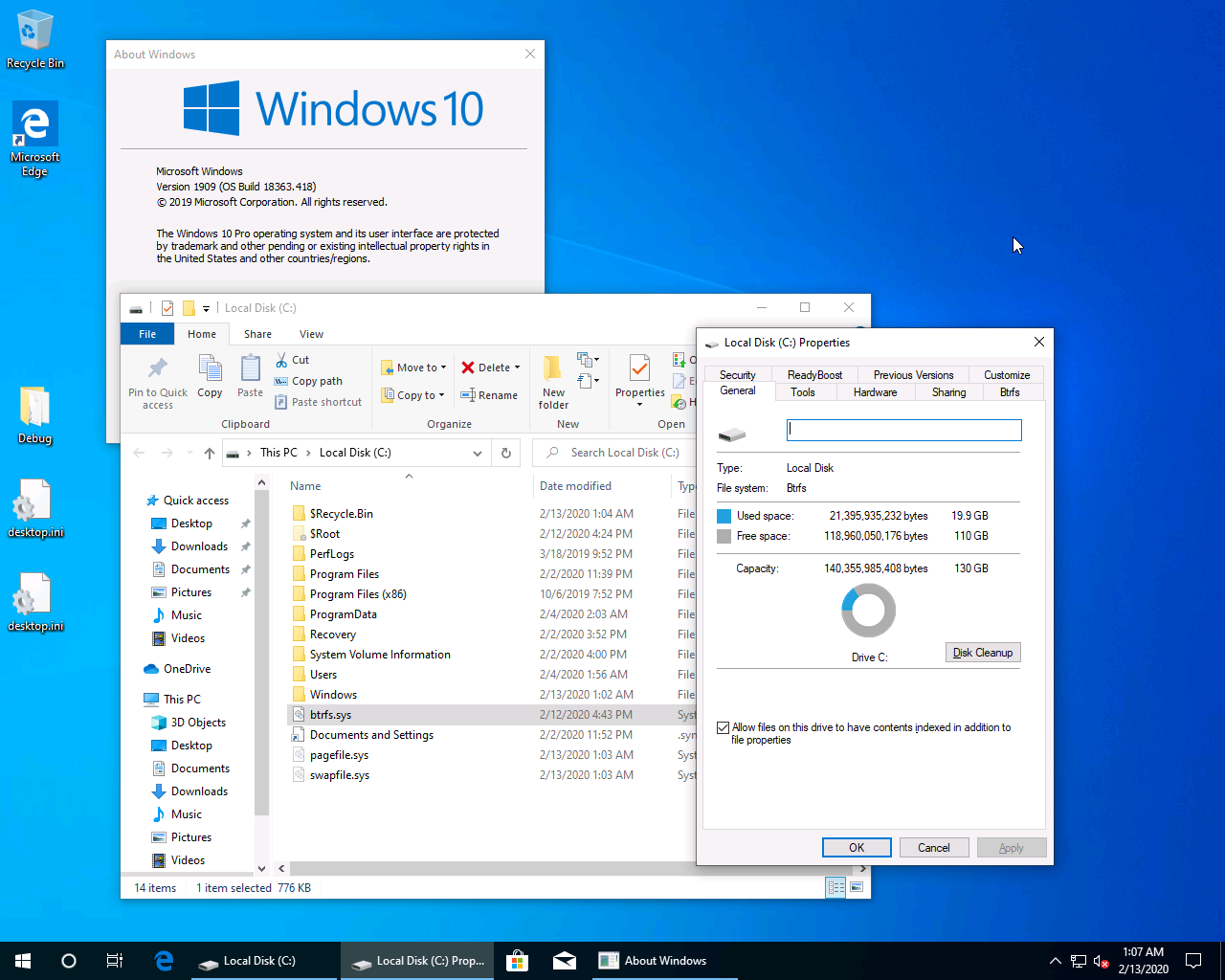Quibble is the custom Windows bootloader - an open-source reimplementation of the files bootmgfw.efi and winload.efi, able to boot every version of Windows from XP to Windows 10 1909. Unlike the official bootloader, it is extensible, allowing you to boot from other filesystems than just NTFS.
This is only a proof of concept at this stage - don't use this for anything serious.
Screenshot of Windows 10 1909 running on Btrfs:
I'm doing this for kicks and giggles, but if you want to donate it'd be appreciated:
This has been tested with Qemu using the OVMF firmware, with Seabios included as a Compatibility Support Module (CSM). It may work on other VMs or hardware, it may not. You will need the CSM version of OVMF, which isn't the usual one bundled with Qemu. Precompiled version are available: x86 and amd64.
-
Set up your VM, and install Windows on an NTFS volume.
-
Install WinBtrfs - you will need version 1.6 at least, but the later the better.
-
On modern versions of Windows, turn off Fast Startup in the Control Panel.
-
Shutdown your VM, and copy its hard disk to a Btrfs partition. The best way is to use Ntfs2btrfs to do in-place conversion, which will also preserve your metadata.
-
Extract the Quibble package into your EFI System Partition. It's supposed to work in a subdirectory, but if you have trouble you might need to put it in the root.
-
Adjust the file freeldr.ini, if necessary - the default is for it to boot from the first partition of the first disk. You can also change the SystemPath to e.g.
SystemPath=btrfs(1e10b60a-8e9d-466b-a33a-21760829cf3a)\Windows, referring to the partition by UUID rather than number. -
Add quibble.efi to your list of UEFI boot options, and hope that it works...
-
20200405
- Fixed bug involving case-insensitivity
- Changed build system to cmake
- Included local copy of gnu-efi, to make things easier
- Added support for compiling on MSVC
- Added support for kdnet on Windows 10
-
20200213
- Initial release
On Linux:
- Install a cross-compiler, either i686-w64-mingw32-gcc or x86_64-w64-mingw32-gcc, and cmake.
- Run the following:
git clone https://github.com/maharmstone/quibblecd quibblemkdir buildcd buildcmake -DCMAKE_TOOLCHAIN_FILE=../mingw-amd64.cmake ..orcmake -DCMAKE_TOOLCHAIN_FILE=../mingw-x86.cmake ..make
On Windows:
- Install a recent version of Visual C++ - I used the free Visual Studio Community 2019
- Clone the repository, and open it as a folder
- Wait for it to finish generating its cmake cache
- Right-click on CMakeLists.txt and choose "Build"
- Which versions of Windows does this work on?
With the Btrfs driver, this should work on XP, Vista, Windows 7, Windows 8, Windows 8.1, and Windows 10 versions 1507 to 1909. XP and Vista work only in 32-bit mode for the time being. Earlier versions ought to work, as the boot structures were backwards-compatible at that point, but the Btrfs driver won't work.
- Which filesystems does this support?
The included Btrfs driver, and maybe also the FAT driver that's part of the UEFI specifications. Windows XP, Vista, and 7 will work fine from a FAT volume, anything after that won't.
- How can I extend this?
Drop your EFI driver in the drivers folder, and it'll load it on startup.
- Why do I get a message about Sequence1 and Sequence2?
This means that the Registry is unclean, which we can't currently recover from. If you attach C:\Windows\System32\config\SYSTEM to another machine via Regedit temporarily, it'll fix it. Make sure you shut Windows down properly to avoid having to do this.
- Can I boot Btrfs from an arbitrary subvolume, like I can on Linux?
Yes - add /SUBVOL=xxx to your Options in freeldr.ini. You can find the number to use on the
Properties page of your subvolume. On Linux you can use btrfs subvol list, but bear in mind
that you will need to translate the number to hexadecimal.
This is released under the LGPL. The Mersenne Twister code is by Mutsuo Saito and Makoto Matsumoto - see the header of tinymt32.c. The GNU-EFI headers are under the BSD licence.
- Multiple cores can be a bit ropey
- Real-life UEFI implementations can differ in their adherence to the specs - caveat usor.
- Booting on Windows 8+ without CSM
- Get working with XP and Vista on amd64
- Add NTFS driver
- Parse BCD files
- Get working better on real hardware
- Add Registry recovery
- Add ARM and Aarch64 versions
- Verification of signatures
- Early-launch anti-malware
- ASLR
- Booting 32-bit Windows on 64-bit machine
- Add RAID support for Btrfs
- Add compression support for Btrfs
- Hibernation, etc.
- Get kdnet working with Windows 8.1
